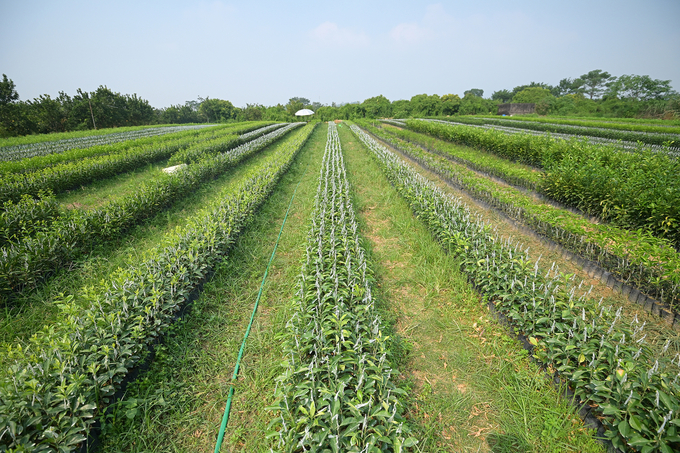May 20, 2025 | 05:00 GMT +7
May 20, 2025 | 05:00 GMT +7
Hotline: 0913.378.918
May 20, 2025 | 05:00 GMT +7
Hotline: 0913.378.918

Mr. Cao Van Chi, Deputy Director in charge of the Citrus Research and Development Center, believes that in addition to using disease-free seedlings, it is essential to change the farming mindset of the local population. Photo: Tung Dinh.
Disease-free seedlings are a crucial input for developing quality, efficient, and sustainable citrus fruit-growing areas.
According to Dr. Cao Van Chi, after being grafted from S1 plants, the S2 seedlings will be nurtured until they meet the standards for planting. These standards include a height of over 60 cm, a grafted branch length of over 40 cm, a graft diameter of over 0.8 cm, a grafted branch diameter of over 0.7 cm, and 2 to 3 primary branches.
However, for the S2 seedlings to thrive, a healthy and disease-free soil foundation is necessary. For orchards that have been infected and need to be cleared, it is important to clean and rehabilitate the soil by planting short-term crops; this process should last at least two years.
Afterwards, growers must prepare the soil, design the planting area, subdivide plots, create pathways, and dig drainage ditches to prevent flooding or localized water accumulation, which could lead to root-damaging diseases. After planting the new disease-free seedlings, it is important to continue intercropping short-term crops for another three years to further improve the soil and support the growth of citrus plants.

Soil rehabilitation is the most important factor for sustainable replanting of citrus trees. Photo: Tung Dinh.
"This is a lengthy process that requires growers to be patient and determined to carry out replanting effectively. Therefore, a shift in the mindset of the orchard owners is necessary," emphasized Dr. Chi.
After planting, it is essential for local residents to regularly maintain the orchard, especially after the harvest period, to eliminate sources of disease and break the cycle of infection. Pruning branches is also crucial to create airflow in the orchard, control the height of the trees for easier care and harvesting.
To supplement nutrition, a balanced fertilization strategy should be implemented, with an emphasis on organic fertilizers to promote beneficial microorganisms in the soil, while avoiding the routine use of foliar fertilizers. Weeds around the base of the trees must be kept clean, and grass should be regularly trimmed using specialized lawnmowers. It is important to never use herbicides, as they can harm the trees and, more critically, destroy beneficial soil microorganisms.
Using disease-free seedlings and applying proper cultivation procedures will help farmers achieve quality and high-yield orchards. However, access to disease-free seed sources still faces certain limitations. The danger lies in the use of unregulated disease-infected citrus seedlings, which may take 2 to 3 years to detect, leading to economic losses far greater than those from short-term crops.

To ensure that a structured seed production system, as shown in the photo, is effective, it is essential to implement stronger control measures to prevent the spread of unregulated and unclear-source seeds. Photo: Tung Dinh.
Therefore, Dr. Cao Van Chi recommends enhancing state management of the quality of citrus fruit seedlings in concentrated production areas. Accordingly, the provincial crop protection and plant protection departments, as well as the agricultural service centres at the district level, are primarily responsible for supervising the production and trading of citrus fruit seedlings.
Seed lots intended for intensive production must clearly demonstrate their origin, have technical processes in place to prevent the re-infection of harmful pests, and possess certificates confirming that the seed lots meet the standards for being marketed.
"We must resolutely prevent seed lots of unclear origin, inadequate quality, and failing to meet marketing standards from being planted in concentrated citrus fruit production areas during replanting initiatives. If detected, these should be promptly destroyed", Dr. Cao Van Chi emphasized.
Fruit growers need to purchase seedlings with clear origins, produced by specialized units with high expertise in citrus fruit cultivation, and from production facilities authorized by relevant authorities.
Translated by Hoang Duy

(VAN) This was the assessment shared by experts at the workshop titled 'Assessing the Role and Potential of Low-Emission Rice Production Systems in Vietnam,' held on the morning of May 19.

(VAN) Cai Rong Port is the fisheries control center of Quang Ninh, helping to monitor fishing vessels, combat IUU fishing, and remove the EC's 'yellow card'.

(VAN) The German Agricultural Society (DLG) explores the possibility of establishing a mechanization service center in Vietnam’s Mekong Delta to support farmers in accessing and utilizing advanced machinery.

(VAN) On May 16, the Department of Water Resources Management, in collaboration with the Food and Agriculture Organization of the United Nations (FAO), held a signing ceremony for the GEF-8 project document.

(VAN) Food safety, mechanization, vocational training, and market opening are key areas of cooperation expected between the Vietnamese Government and the Federal Republic of Germany.

(VAN) Deputy Minister Nguyen Quoc Tri also expressed his hope that Cuba will soon overcome its current challenges, attain food security, and further expand cooperation with Vietnam.

(VAN) The project contributes to enhancing the resilience of communities vulnerable to the impacts of climate change, with a primary focus on local women.